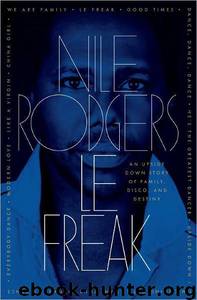Le Freak: An Upside Down Story of Family, Disco, and Destiny by Nile Rodgers

Author:Nile Rodgers
Language: eng
Format: mobi
ISBN: 0385529651
Publisher: Spiegel & Grau
Published: 2011-10-01T00:00:00+00:00
IN TWO SHORT YEARS, we’d forgotten how special it was to sell a million copies of a single song. It wasn’t because we were arrogant; we were just on a hit-making treadmill, with no time to savor the accomplishments. Within a few years, we’d learn just how important the gold and platinum records were, because for Chic they’d stop coming.
(Illustration credit 7.4)
There’s a line I like from the film Highlander: “There can be only one.” Truer words have never been spoken. Around the time we found ourselves too busy to pick up yet another platinum record (yawn) for our latest hit single “Good Times,” there was another song tracking neck and neck with us. It was a catchy ditty called “My Sharona,” by a new band called the Knack. “Sharona” ’s meteoric rise in the summer of ’79 happened to coincide with a circus-like novelty event called Disco Demolition Night, in which the participants lost control and almost destroyed the Chicago stadium where it took place. It all started as a prank by a DJ from a local radio station who’d been fired when they changed the format from rock to disco, and morphed into a movement called Disco Sucks.
Now, I love silly gags and satirical entertainment and enjoy cheap thrills. I’m liberal, understand the right to protest, and am open-minded, with a pretty good sense of humor (I sound like I’m a beauty pageant contestant), but what happened during the Disco Sucks phase was astonishing to me.
Bernard and I always believed that most pop music fits into the broad category called rock and roll. Rock and roll was ever changing, and this art form had different genres of classification for the benefit of consumers, like sections in a library or bookstore. Once any genre—folk, soul, rock, or even some jazz—reaches a certain position on the pop charts, it does what’s known in the music business as crossing over, and gets played on the Top Forty stations. That’s the reason so many of us own songs by artists from genres we normally wouldn’t—their hit songs crossed over into the pop Top Forty mainstream.
When a genre repeatedly crosses over and comes to dominate the Top Forty, what had originated as an insurgency becomes the new ruling class. This was the path disco had taken—from the margins where it started, a weird combination of underground gay culture and funk and gospel-singing techniques and, in the case of Chic, jazz-inflected groovy soul. But it was basically all rock and roll, historically speaking, as far as we were concerned.
But the media and the industry pitted us against the Knack—the disco kings in their buppie uniforms versus the scrappy white boys. But we never saw it that way. We thought we were all on the same team, even if our voices and songs followed different idioms.
Boy, were we naïve.
And boy, did things change.
I would love to say things went downhill just because our records weren’t good enough, and I do think our later work wasn’t as commercial (or good) as our earlier work.
Download
This site does not store any files on its server. We only index and link to content provided by other sites. Please contact the content providers to delete copyright contents if any and email us, we'll remove relevant links or contents immediately.
The Goal (Off-Campus #4) by Elle Kennedy(13674)
Kathy Andrews Collection by Kathy Andrews(11834)
Diary of a Player by Brad Paisley(7581)
Assassin’s Fate by Robin Hobb(6223)
What Does This Button Do? by Bruce Dickinson(6207)
Big Little Lies by Liane Moriarty(5804)
Altered Sensations by David Pantalony(5105)
Pale Blue Dot by Carl Sagan(5009)
Sticky Fingers by Joe Hagan(4199)
The Death of the Heart by Elizabeth Bowen(3622)
The Heroin Diaries by Nikki Sixx(3550)
Confessions of a Video Vixen by Karrine Steffans(3309)
Beneath These Shadows by Meghan March(3308)
How Music Works by David Byrne(3271)
The Help by Kathryn Stockett(3150)
Jam by Jam (epub)(3093)
Harry Potter 4 - Harry Potter and The Goblet of Fire by J.K.Rowling(3074)
Computational Linguistics and Intelligent Text Processing: 20th International Conference, CICLing 2019 La Rochelle, France, April 7â13, 2019 Revised Selected Papers, Part I by Alexander Gelbukh(2995)
Strange Fascination: David Bowie: The Definitive Story by David Buckley(2872)
